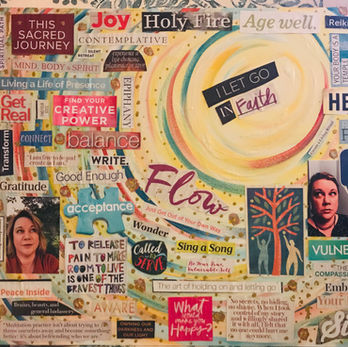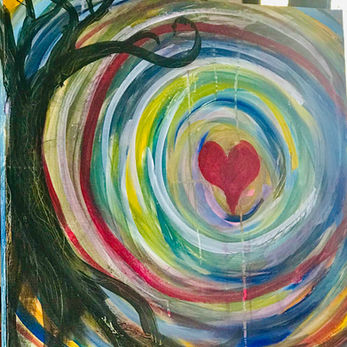Peace be with you.
As an interfaith, interspiritual spiritual director rooted in my Lutheran heritage (whew! that's a mouthful), I welcome people of all backgrounds. I am particularly called to accompany those who have been hurt by the church, either from within or without.


More Learning + Connections
-
Trauma-Informed Care, Root Grow Thrive
-
Creating a Rule of Life, Sacred Ordinary Days
-
Racial Justice Training, Lower Susquehanna Synod
-
Huddle Methodology, Rev. Matthew Best
-
Boundaries Training, Lower Susquehanna Synod
-
Enneagram Workshop, Breathing in Christ
-
Dreamwork Introduction, Spiritual Directors International with instructors from Haden Institute
-
Reiki I, Sarah Amala
-
Old Testament, United Lutheran Seminary (formerly Gettysburg Theological Seminary)
-
Member, Spiritual Directors International
-
Member, Shalem Society
-
Member, Contemplative Society
Formal Education
-
Bachelor of Arts in Honors English, Pennsylvania State University
-
Spiritual Guidance Program, Shalem Institute for Spiritual Formation
My Spiritual Journey (thus far)
A Rural Upbringing
I grew up on a central Pennsylvania farm. My family worshiped at a small Lutheran church just over the hill, home to generations of ancestors. In small churches, you get involved in a bit of everything, and so that church—along with the farm and nearby relatives—set the rhythm of our lives. My imagination was fueled by field and forest. We children made the rounds of the summer Bible school circuit as well, getting to know our Brethren and United Church of Christ neighbors. I grew up watching my parents lead across many organizations with compassion and service, a direction I was glad to follow.
My faith practices were also shaped by concepts embedded in much of American Christianity at the time: an adherence to duty and patriarchal hierarchy, and a definition of piety rooted in selflessness. Though it took me years to recognize these unspoken norms, at the time I did notice the judgmental whispers when a pastor divorced. I was disturbed by cartoon tracts handed out at the local farm show, threatening hell to those who didn’t believe. It seemed odd that checking off confirmation requirements felt more important to some than a person’s genuine desire to profess faith. But I stayed quiet—because I didn’t know I had another option.
Branching Out
My college summers were blissfully spent working as a counselor at a Lutheran church camp. We had structure—for safety and schedule—but also an empowering freedom in leading Bible studies and worship and in engaging with the campers in our care. That camp in the woods was a haven, seemingly separate from the outside world. While not without its flaws, it sparked a lasting yearning in me to be part of communities shaped by purpose and care.
After college, I married and spent the next 30+ years in many roles: youth and camp director, librarian, stay-at-home parent to our two children, nonprofit leader, and board member for nearly a dozen organizations. Some roles were church-based; others focused on affordable housing, racial justice, and post-adoption support. Community service remained an expression of faith but I also began to embrace the Lutheran tradition of asking questions rather than blindly following. I was noticing how institutions often try to define and shape what is holy. I started exploring additional spiritual spaces—women’s circles, contemplative practices, and creative classes.
Witnessing Pain
You know what I discovered? These new (to me) communities had much to offer—and much in common with their church-based counterparts. Both carry similar hopes and practices, though they often call them different things. And both, at times, harbor a wary suspicion of the other. I have come to see neither are immune to dysfunction. Wherever humans gather, there is the potential for harm—rooted in ego, fear, and control. I’ve witnessed and experienced spiritual harm in a variety of settings and know how deeply it can fracture our connection to the Divine. That realization stirred in me a longing to be part of the healing—both in individual lives and in the wider world.
A Return to Roots
Recent years have brought some radical shifts. I was spending more time than I wanted chasing the bright-and-shiny, less important things of life, while a deeper part of me longed for stillness, simplicity, and a slower pace. In late 2018, I asked the Spirit for guidance and heard two words: creativity and contemplation. Though I didn’t fully realize it at the time, leaning into those two words became a pathway back to some of the best parts of myself.
Following the Flow
What has evolved? More being. Less doing for doing’s sake. Learning to follow what shimmers instead of what society prescribes. Redirecting my creative energy from productivity to playfulness. Trusting my intuition as a way the Spirit speaks. Recognizing my lifelong gift for holding space—whether at camp, in a church parking lot, or at a conference—and feeling the Spirit nudge that gift toward something more intentional through spiritual direction. While still an ELCA Lutheran, I’ve stepped back from traditional congregational life and am waiting for what’s next—something creative, spiritual, and rooted in community. For now, I am listening from the roots and living in the flow.
Holding you in love and light,
Stacy
(she/her)
PHOTO CREDITS: Homepage (top left) R. David Cummins for Unsplash. About Page (family photo) Pam Hopple, (bottom image) Michael Long. All other photos are mine featuring some of the sacred places in my life.












